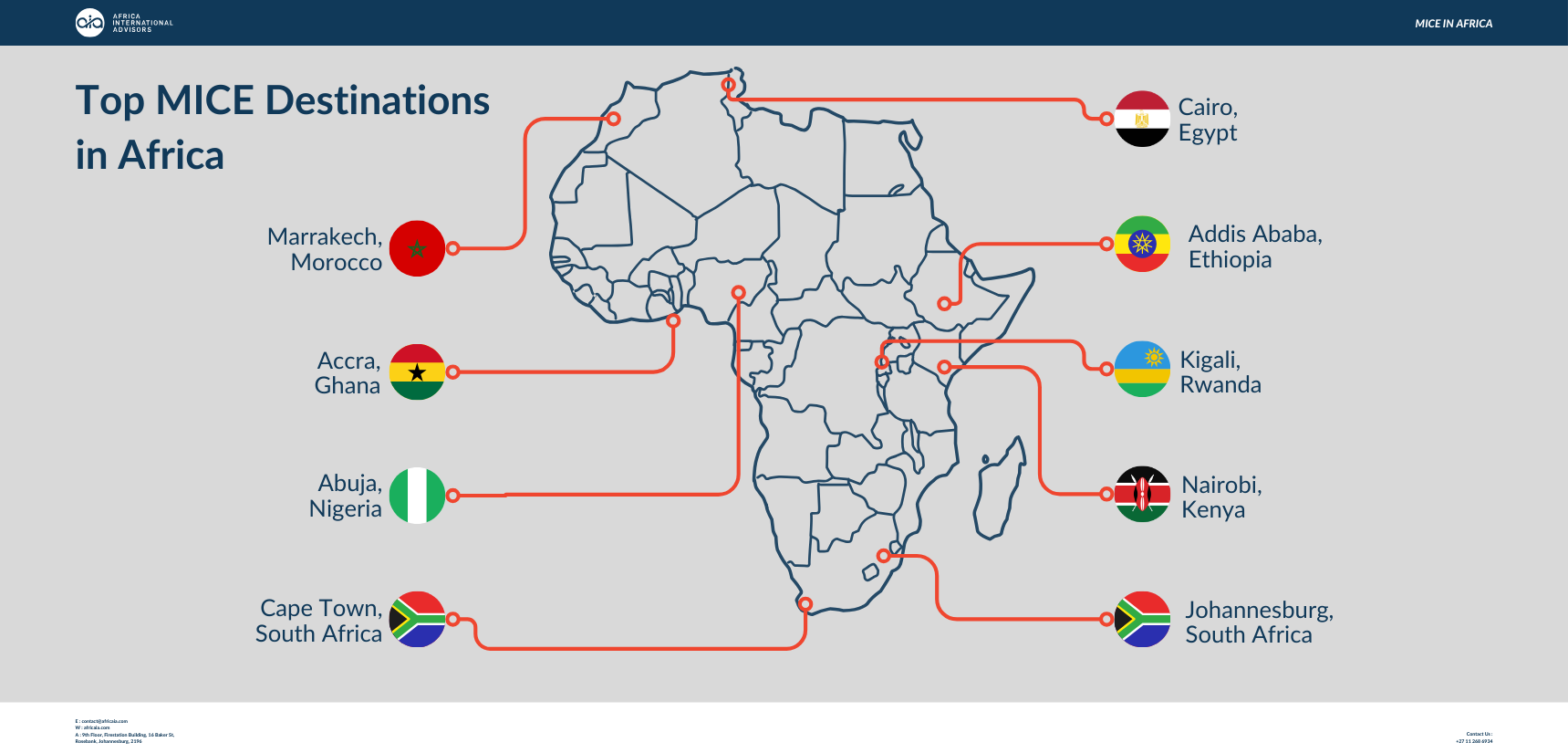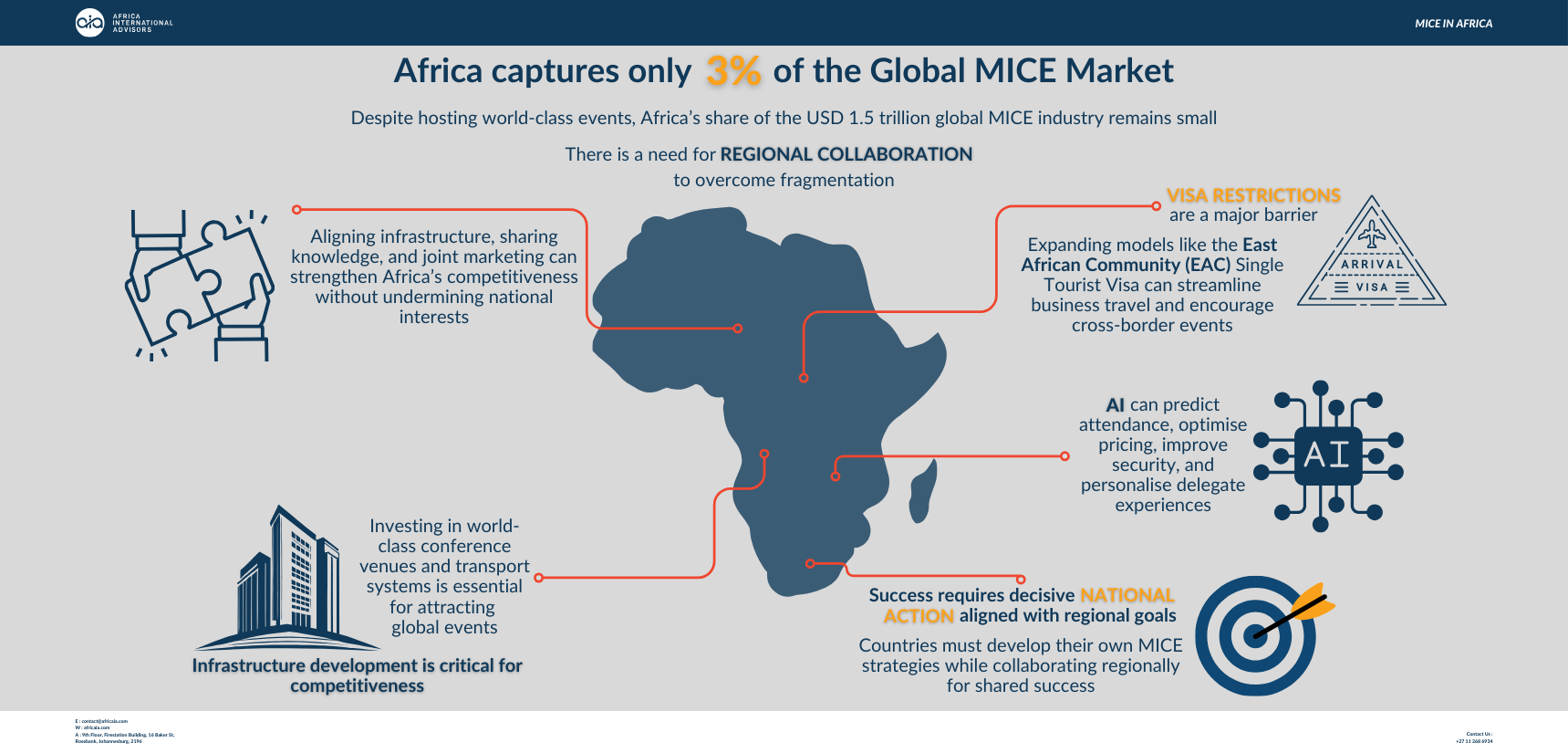As Meetings Africa 2025 convenes in Johannesburg from 24 to 26 February, it is more than just a platform for showcasing Africa’s potential in business tourism. It is a litmus test for the continent’s ability to compete in the USD 1.5 trillion global meetings, incentives, conferences, and exhibitions (MICE) industry. With Africa currently capturing just 3% of global business tourism, the question is no longer whether the continent has potential, but rather how it can translate ambition into sustained competitiveness.
Africa has already demonstrated that it can host world-class business events. Kigali has become a leader in hosting high-profile conferences, Cape Town consistently ranks among the top business events destinations, and Nairobi is strengthening its position as a regional hub. However, these successes remain largely isolated. The broader African business events industry faces infrastructure gaps, restrictive visa policies, and weak regional cooperation, preventing it from unlocking its full potential. If Africa is to truly compete, it must move beyond fragmented efforts and embrace smart collaboration backed by decisive national action.

Balancing Competition and Collaboration in Africa’s business events Market
Continental initiatives such as the African Continental Free Trade Area (AfCFTA) have been lauded as a game-changer for intra-African cooperation, aiming to reduce barriers across industries, including tourism and business events. However, its impact on the business events sector has been limited due to slow implementation and competing national interests. Unlike ASEAN, which has established cross-border tourism and business events agreements, Africa’s business events landscape remains fragmented.
Rather than seeing business events as a purely competitive industry where cities and nations bid for the same events, Africa must reframe its approach. While direct collaboration on event bidding may be complex, strategic knowledge-sharing, infrastructure alignment, and joint marketing efforts can provide mutual benefits without undermining national interests. Africa’s challenge is not whether countries should compete—they already do—but how they can integrate regional frameworks to strengthen their competitiveness and create a thriving, sustainable business events ecosystem.
The Visa Conundrum: Selective Policy Reforms for Business Travel Growth
Travel restrictions remain one of the biggest barriers to Africa’s competitiveness in the global business events industry. According to the Africa Visa Openness Index, the continent remains one of the most restrictive regions for business travel, with many African professionals requiring visas to enter neighbouring countries. Similarly, international delegates often face lengthy visa approval processes, discouraging attendance at African-hosted conferences.
While AfCFTA envisions a borderless business environment, progress on visa liberalisation has been slow, with security concerns and political hesitations preventing full-scale implementation. Unlike Europe’s Schengen Agreement, which facilitates seamless travel for business events, Africa’s visa policies remain fragmented and inconsistent, creating logistical hurdles for international conferences.
A pragmatic model already exists: the East African Community (EAC) Single Tourist Visa, which allows seamless travel across Kenya, Rwanda, and Uganda. Expanding this initiative to business travellers and replicating it across other regional blocs such as Southern African Development Community (SADC) could provide a powerful boost to Africa’s business events sector. A delegate attending a conference in South Africa could easily extend their trip to Namibia, generating spillover benefits. These reforms would make Africa more attractive to international investors and event organisers while fostering intra-African business growth.
AI as a Driver of Efficiency and Competitiveness in Africa’s business events Industry
Artificial intelligence (AI) is rapidly reshaping the business events industry, making events more efficient, enhancing delegate experiences, and improving overall event management. With half of meeting planners prioritising AI adoption in 2025 and 42% already using it for attendee matchmaking, the shift is well underway.
For Africa, where infrastructure gaps and logistical challenges often hold the industry back, AI presents an opportunity to level the playing field. Tools like predictive analytics can help organisers anticipate attendance trends, fine-tune pricing strategies, and make better use of limited resources. Similarly, AI-powered chatbots and virtual assistants can offer real-time event updates, personalised recommendations, and seamless delegate support, significantly enhancing the attendee experience. Even complex processes like visa approvals and security screening can be streamlined with AI-driven biometric verification, reducing wait times and improving accessibility.
Sustainability is also a growing priority for business events, and AI can help African business events destinations align with global environmental standards. By optimising energy use, minimising waste, and tracking carbon footprints, AI-driven solutions can make events greener and more cost-effective.

The Way Forward
Africa’s business events industry stands at a pivotal moment, with the opportunity to transform itself into a global force through smart regional collaboration and decisive national action. To compete effectively, countries must take bold steps—streamlining visa policies, improving regional collaboration, and integrating AI-driven innovations to enhance efficiency and the delegate experience. At the same time, regional partnerships should focus on joint marketing efforts, shared resources, and policy alignment to strengthen Africa’s standing in the global business events market. The continent does not need a one-size-fits-all approach but rather a strategy that allows nations to harness their strengths while working together to create a seamless, competitive business events ecosystem.
However, success hinges not on ambition alone but on execution. A phased, regionally driven approach is far more realistic than an overly centralised continental solution. Countries must take ownership of their own business events strategies, ensuring national implementation aligns with broader regional cooperation where it makes sense. If Africa is to stake its claim in the $1.5 trillion global business events industry, it must move beyond rhetoric and embrace a model of collaboration that balances national priorities with collective progress.
This article was written by Ayodele Morobi, Jana de Kluiver, and Shaaziah Kolabhai
Want to explore how smart collaboration and AI-driven innovation can elevate your business in Africa’s business events industry?
Reach out to us at ayodele.m@africaia.com
Feb 2025 Competitiveness Regional Integration Artificial Intelligence Meetings Africa Business Events

Ayodele Morobi

Jana De Kluiver
